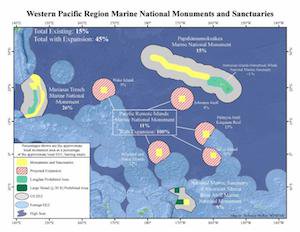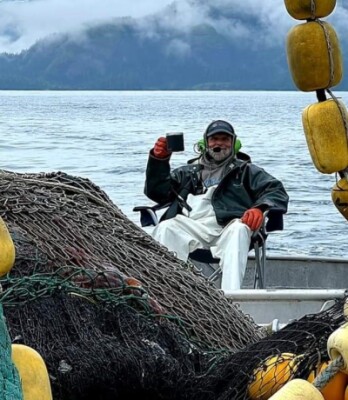Consider this a shout-out to the Western Pacific Fishery Management Council members and others who traveled to the White House to make the case, if in vain, that the proposed expansion of the Pacific Remote Islands Marine National Monument to 700,000 square miles is misguided policy.
This map illustrates the vast expanse of ocean that would be off limits to fishermen with the proposed expansion of the Pacific Remote Islands Marine National Monument. Wetern Pacific Regional Fishery Management Council illustrationIn what was described as a "frank discussion," the nine-member delegation told the White House Council on Environmental Quality that the monument would penalize the U.S. Pacific islands and American fishermen while accomplishing little environmentally.
This is accurate. For one thing, the area is pristine, which forecloses on the notion of environmental improvement. For another, the fish the monument would "protect" are highly migratory. U.S. fishermen could pursue them outside the monument at hideous expense, or, more likely, they'll be harvested by the Chinese.
By the way, for those of you who do not regularly consume political news, "frank discussion" implies that the delegates expressed the truth bluntly and that the representatives of the administration, which included John Podesta, counselor to the president, didn't want to hear it.
No surprise there. Had the administration been inclined to consider the issue on its merits it would have in the first place consulted with the fishery council and stakeholders.
As Ray Hilborn of University of Washington's School of Aquatic and Fishery Sciences, observed last month, "The key question with respect to the expanded protections proposed by President Obama is, 'What will they do to aid solutions to the problems facing oceans?"
"I am afraid the answer to this is they will do nothing. Closing additional areas to fishing will have no impact on ocean acidification or ocean pollution, and the impact of these closures on overfishing will almost certainly be negligible."
Hilborn is correct, for what good it amounts to. The administration has pursued the "do it if it feels good" policy which colors so much of our environmental regulation today. And however well meaning, if uninformed, this policy is, the opposite result is certain to obtain in the western Pacific once China starts vacuuming things up.
Clair Poumele, a member of the Western Pacific council and director of the American Samoa Port Authority, said the monument would have a disastrous impact on the territory's tuna canning operations, which employ one-third of the population.
As Sean Martin, of the Hawai'i Longline Association observed, "This attempt at crafting an environmental legacy for our nation will ultimately prove to accomplish the opposite by disenfranchising our own fishermen and outsourcing domestic seafood demand to nations whose standards for environmental protections pale in comparison to our own."







